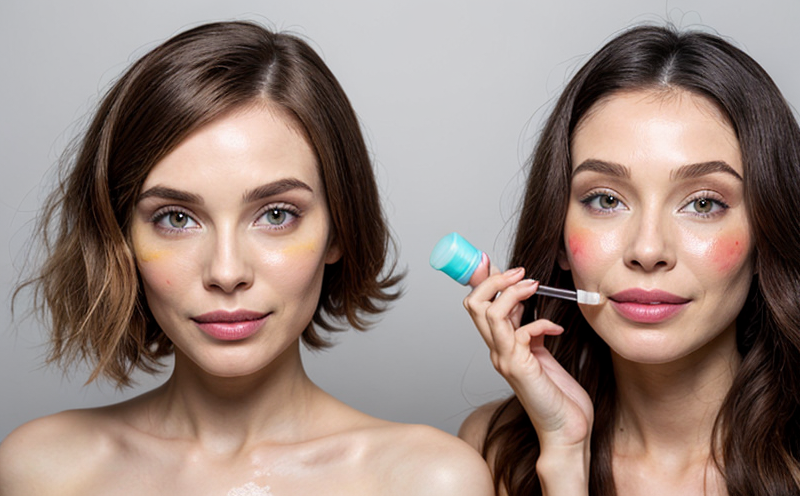Clinical Tolerance Testing in Sensitive Skin Cosmetics
Clinical tolerance testing is a crucial step in ensuring that cosmetic products are safe for use, especially on sensitive skin. This form of testing goes beyond basic lab evaluations by assessing the potential allergenic and irritant effects of cosmetics through controlled clinical trials involving human subjects.
The goal is to identify any adverse reactions such as redness, itching, or hives that could indicate an allergic response or irritation. Sensitive skin types are particularly prone to these issues due to their thinner epidermis and higher permeability. By conducting tolerance tests, manufacturers can ensure that their products meet safety standards before they reach the market.
In this type of testing, the product is applied under controlled conditions over a specified period (often 24 hours). Participants are closely monitored for any signs of irritation or allergic reactions. This process helps in understanding not only how the product behaves on sensitive skin but also its overall safety profile.
It's important to note that clinical tolerance testing is more than just an ethical requirement; it's a legal necessity in many countries, including the EU and US. Regulatory bodies like the European Union's Cosmetics Regulation (EC 1272/2006) mandate such tests for new cosmetic ingredients and formulations.
The test results are critical for product development and marketing strategies. They provide valuable insights into which components might need reformulation or additional warnings on packaging. For quality managers, these findings are essential for maintaining compliance with international standards like ISO 20791:2016, which specifies good practices for the manufacture of cosmetics.
From an R&D perspective, clinical tolerance testing allows cosmetic chemists to refine formulas by identifying irritants or allergens early in development. This iterative process can lead to safer and more effective products without compromising efficacy.
For procurement teams, understanding the importance of this type of testing ensures they select suppliers who adhere to these rigorous standards, thereby safeguarding their brand's reputation for quality and safety.
Why It Matters
Clinical tolerance testing is pivotal in safeguarding the health of consumers and ensuring that cosmetic products are safe when used as intended. Sensitive skin conditions such as eczema, rosacea, or dermatitis can exacerbate even minor irritations caused by skincare products. Therefore, it's imperative for manufacturers to demonstrate through clinical trials that their products do not cause adverse reactions.
Consumer trust is built on transparency and reliability. When companies openly share the results of these tests, they foster a sense of responsibility towards their customers' well-being. This approach also aligns with broader industry trends toward natural and organic cosmetics, where ingredient sourcing and processing methods are increasingly scrutinized for potential allergens or irritants.
From a regulatory standpoint, adherence to clinical tolerance testing protocols is non-negotiable. Failure to comply can result in product recalls, fines, and reputational damage. For instance, the EU's Cosmetics Regulation stipulates that all cosmetics must undergo safety assessments before being placed on the market. This includes verifying through clinical trials that they are safe for use by individuals with sensitive skin.
Moreover, the data gathered from these tests can influence consumer behavior positively. Positive outcomes encourage repeat purchases and favorable reviews, enhancing brand loyalty and market share. Conversely, negative results could lead to product bans or withdrawals, impacting sales and profitability negatively.
International Acceptance and Recognition
Clinical tolerance testing is widely accepted across various regions, with stringent guidelines set by international bodies. For example, the European Union's Cosmetics Regulation (EC 1272/2006) mandates that all cosmetics must pass safety assessments before being placed on the market. This includes demonstrating through clinical trials that they are safe for use by individuals with sensitive skin.
Similarly, in the United States, the FDA requires manufacturers to ensure that their products are not reasonably expected to cause injury or illness when used as intended. Clinical tolerance testing plays a key role in meeting these safety requirements.
In Asia, countries like Japan and South Korea have similar regulations emphasizing the importance of clinical trials for sensitive skin products. These regions also emphasize the need for transparency in reporting test results, which helps build consumer confidence and trust.
The International Organization for Standardization (ISO) has published ISO 20791:2016, specifying good practices for the manufacture of cosmetics. This standard includes guidelines on how to conduct clinical tolerance testing effectively. Adherence to these standards ensures that products meet international quality benchmarks and are acceptable in various markets.
Recognition from such bodies not only enhances a company's credibility but also opens doors to export opportunities globally. Companies that comply with international standards often receive favorable mentions in industry reports, further boosting their standing within the cosmetic sector.
Use Cases and Application Examples
- New Product Launch: Clinical tolerance testing is essential during the launch of a new natural or organic cosmetic product to ensure it meets safety standards before reaching consumers.
- Ingredient Reformulation: When reformulating an existing formula, this test helps identify any changes in irritancy levels due to ingredient substitutions.
- Allergy Testing: For products containing new allergens or those that are already known sensitizers, clinical tolerance testing ensures they do not cause adverse reactions.
- Sensitivity Mapping: This test maps out the potential sensitivity profiles of various ingredients and formulations on different skin types.
- Packaging Changes: If there's a change in packaging that might affect how the product interacts with sensitive skin, clinical tolerance testing ensures this doesn't lead to increased irritancy or allergenicity.
In each case, the test provides critical data on the safety and tolerability of the cosmetic under various conditions. This information is invaluable for product developers and marketers in making informed decisions about formulation adjustments and labeling requirements.





